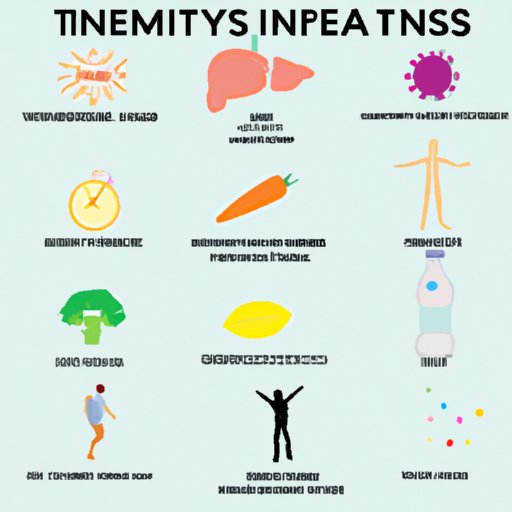Introduction
The immune system is our body’s natural defense against bacteria, viruses, and other potentially harmful pathogens. When functioning properly, it helps us fight off infection and stay healthy. Unfortunately, many of us don’t take the necessary steps to maintain a strong immune system, leaving us vulnerable to illness and disease.

Eating a Healthy Diet Rich in Fruits and Vegetables
One of the most important things you can do to support your immune system is to eat a balanced diet rich in fruits and vegetables. Fruits and vegetables are loaded with essential vitamins, minerals, and antioxidants that help keep your immune system functioning optimally. Studies have shown that diets with higher amounts of fruit and vegetable intake are associated with lower incidences of infection.
Fruits and vegetables are particularly high in vitamins A, C, and E, all of which are important for boosting immunity. Vitamin A helps regulate the immune system, while vitamins C and E act as powerful antioxidants that can protect your cells from damage. Other nutrients found in fruits and vegetables include zinc, selenium, and iron, all of which are important for maintaining a healthy immune system.
If you’re looking to increase your intake of fruits and vegetables, try adding them to smoothies or salads, snacking on them throughout the day, or substituting them for unhealthy snacks. You can also incorporate more produce into meals by using them as side dishes or adding them to soups and stews.
Exercise Regularly
Regular physical activity has been linked to improved immune function. Exercise helps flush toxins and bacteria out of your system, increases circulation, and helps your body produce white blood cells, which are essential for fighting off infection. It also releases endorphins, which can help reduce stress levels and improve overall mood.
When it comes to exercising for better immunity, any type of physical activity is beneficial. However, some forms of exercise may be more effective than others. For example, high-intensity interval training (HIIT), resistance training, and aerobic exercises like running, swimming, and cycling are all great options for boosting your immune system.
If you’re new to exercise, start slow and gradually build up your intensity. Try to aim for 30 minutes of physical activity a day, five days a week. You can also break up your workouts into smaller chunks of 10 minutes each if that works better for you.
Getting Enough Sleep
Sleep plays a vital role in keeping your immune system healthy. Studies show that people who get less than seven hours of sleep per night are more likely to get sick after being exposed to a virus. That’s because sleep deprivation disrupts the production of cytokines, which are proteins that help fight infection.
Adults should aim for 7-9 hours of quality sleep per night. To get better sleep, create a consistent bedtime routine, avoid caffeine and alcohol late in the day, and limit screen time before bed. Additionally, make sure your bedroom is dark, quiet, and comfortable.
Minimizing Stress
Stress has a significant impact on the immune system. Chronic stress can cause inflammation, suppress the immune response, and weaken the body’s ability to fight infection. It can also lead to unhealthy behaviors such as overeating, smoking, and drinking, all of which can further compromise your immune system.
To reduce stress levels, practice mindfulness activities such as meditation and deep breathing. You can also try engaging in activities that bring you joy, like listening to music or spending time in nature. Additionally, making time for yourself and setting boundaries with work and family commitments can help you manage stress more effectively.
Taking Vitamin Supplements
Vitamin supplements can be a helpful way to ensure you’re getting the nutrients your body needs to stay healthy. Vitamins A, C, and D are especially important for boosting immunity. Vitamin A helps regulate the immune system, while vitamins C and D help support the body’s natural defenses.
It’s important to talk to your doctor before taking any supplements to make sure they’re right for you. Most adults need around 400-800 IU of vitamin D daily, 500-1000 mg of vitamin C daily, and 700-900 mcg of vitamin A daily. If you’re deficient in any of these vitamins, your doctor may recommend a higher dose.
Avoiding Smoking and Excessive Alcohol Consumption
Smoking and excessive drinking can weaken your immune system and make you more susceptible to illness and disease. Cigarette smoke contains toxins that can damage your lungs and impair your body’s ability to fight infection. Alcohol consumption can also impair your immune system by reducing the number of white blood cells in your body.
If you’re trying to cut back on smoking or drinking, start by setting realistic goals for yourself. Make sure to reward yourself for reaching those goals, and don’t be too hard on yourself if you slip up. Additionally, ask for support from friends and family members who can help you stay on track.
Conclusion
Your immune system is a complex network of cells and proteins that work together to keep you healthy. Eating a nutritious diet, exercising regularly, getting enough sleep, minimizing stress, taking vitamin supplements, and avoiding smoking and excessive alcohol consumption are all important steps for boosting your immune system.
By following these tips, you can keep your immune system strong and help protect your body against infection and disease. Remember, the key to a healthy immune system is consistency, so make sure to prioritize self-care and develop healthy habits that you can stick to over time.
(Note: Is this article not meeting your expectations? Do you have knowledge or insights to share? Unlock new opportunities and expand your reach by joining our authors team. Click Registration to join us and share your expertise with our readers.)
